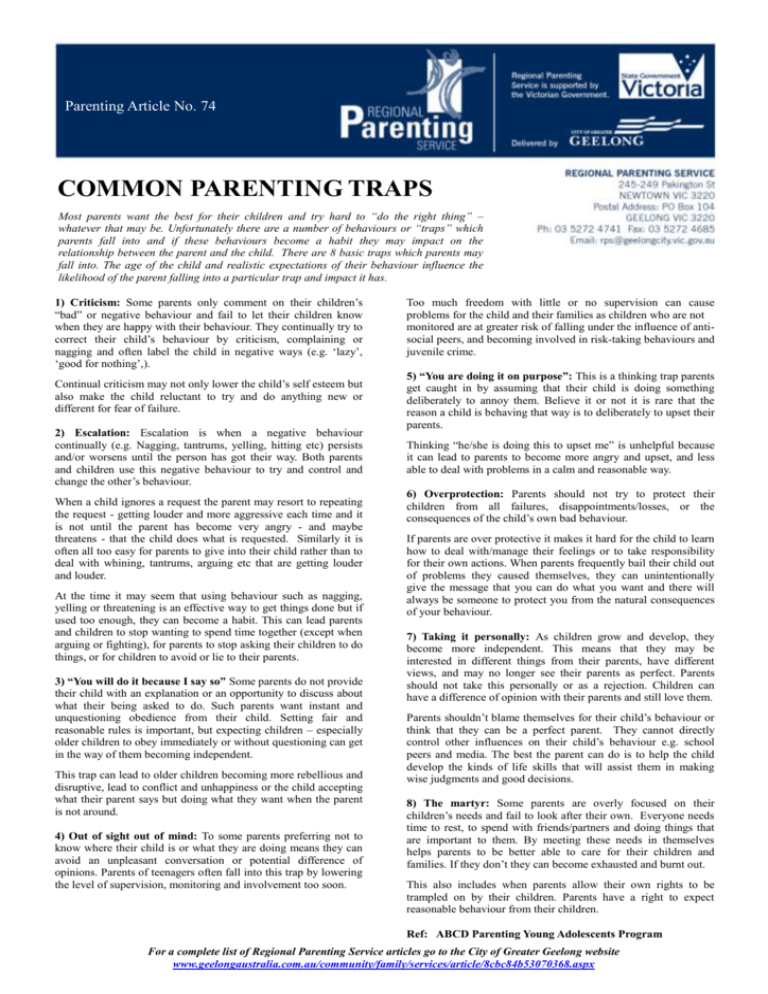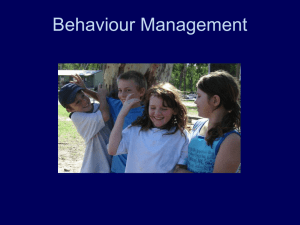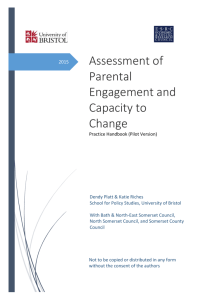Parents often say they want their children to be happy, feel good
advertisement

Parenting Article No. 74 COMMON PARENTING TRAPS Most parents want the best for their children and try hard to “do the right thing” – whatever that may be. Unfortunately there are a number of behaviours or “traps” which parents fall into and if these behaviours become a habit they may impact on the relationship between the parent and the child. There are 8 basic traps which parents may fall into. The age of the child and realistic expectations of their behaviour influence the likelihood of the parent falling into a particular trap and impact it has. 1) Criticism: Some parents only comment on their children’s “bad” or negative behaviour and fail to let their children know when they are happy with their behaviour. They continually try to correct their child’s behaviour by criticism, complaining or nagging and often label the child in negative ways (e.g. ‘lazy’, ‘good for nothing’,). Too much freedom with little or no supervision can cause problems for the child and their families as children who are not monitored are at greater risk of falling under the influence of antisocial peers, and becoming involved in risk-taking behaviours and juvenile crime. Continual criticism may not only lower the child’s self esteem but also make the child reluctant to try and do anything new or different for fear of failure. 5) “You are doing it on purpose”: This is a thinking trap parents get caught in by assuming that their child is doing something deliberately to annoy them. Believe it or not it is rare that the reason a child is behaving that way is to deliberately to upset their parents. 2) Escalation: Escalation is when a negative behaviour continually (e.g. Nagging, tantrums, yelling, hitting etc) persists and/or worsens until the person has got their way. Both parents and children use this negative behaviour to try and control and change the other’s behaviour. When a child ignores a request the parent may resort to repeating the request - getting louder and more aggressive each time and it is not until the parent has become very angry - and maybe threatens - that the child does what is requested. Similarly it is often all too easy for parents to give into their child rather than to deal with whining, tantrums, arguing etc that are getting louder and louder. At the time it may seem that using behaviour such as nagging, yelling or threatening is an effective way to get things done but if used too enough, they can become a habit. This can lead parents and children to stop wanting to spend time together (except when arguing or fighting), for parents to stop asking their children to do things, or for children to avoid or lie to their parents. 3) “You will do it because I say so” Some parents do not provide their child with an explanation or an opportunity to discuss about what their being asked to do. Such parents want instant and unquestioning obedience from their child. Setting fair and reasonable rules is important, but expecting children – especially older children to obey immediately or without questioning can get in the way of them becoming independent. This trap can lead to older children becoming more rebellious and disruptive, lead to conflict and unhappiness or the child accepting what their parent says but doing what they want when the parent is not around. 4) Out of sight out of mind: To some parents preferring not to know where their child is or what they are doing means they can avoid an unpleasant conversation or potential difference of opinions. Parents of teenagers often fall into this trap by lowering the level of supervision, monitoring and involvement too soon. Thinking “he/she is doing this to upset me” is unhelpful because it can lead to parents to become more angry and upset, and less able to deal with problems in a calm and reasonable way. 6) Overprotection: Parents should not try to protect their children from all failures, disappointments/losses, or the consequences of the child’s own bad behaviour. If parents are over protective it makes it hard for the child to learn how to deal with/manage their feelings or to take responsibility for their own actions. When parents frequently bail their child out of problems they caused themselves, they can unintentionally give the message that you can do what you want and there will always be someone to protect you from the natural consequences of your behaviour. 7) Taking it personally: As children grow and develop, they become more independent. This means that they may be interested in different things from their parents, have different views, and may no longer see their parents as perfect. Parents should not take this personally or as a rejection. Children can have a difference of opinion with their parents and still love them. Parents shouldn’t blame themselves for their child’s behaviour or think that they can be a perfect parent. They cannot directly control other influences on their child’s behaviour e.g. school peers and media. The best the parent can do is to help the child develop the kinds of life skills that will assist them in making wise judgments and good decisions. 8) The martyr: Some parents are overly focused on their children’s needs and fail to look after their own. Everyone needs time to rest, to spend with friends/partners and doing things that are important to them. By meeting these needs in themselves helps parents to be better able to care for their children and families. If they don’t they can become exhausted and burnt out. This also includes when parents allow their own rights to be trampled on by their children. Parents have a right to expect reasonable behaviour from their children. Ref: ABCD Parenting Young Adolescents Program For a complete list of Regional Parenting Service articles go to the City of Greater Geelong website www.geelongaustralia.com.au/community/family/services/article/8cbc84b53070368.aspx








